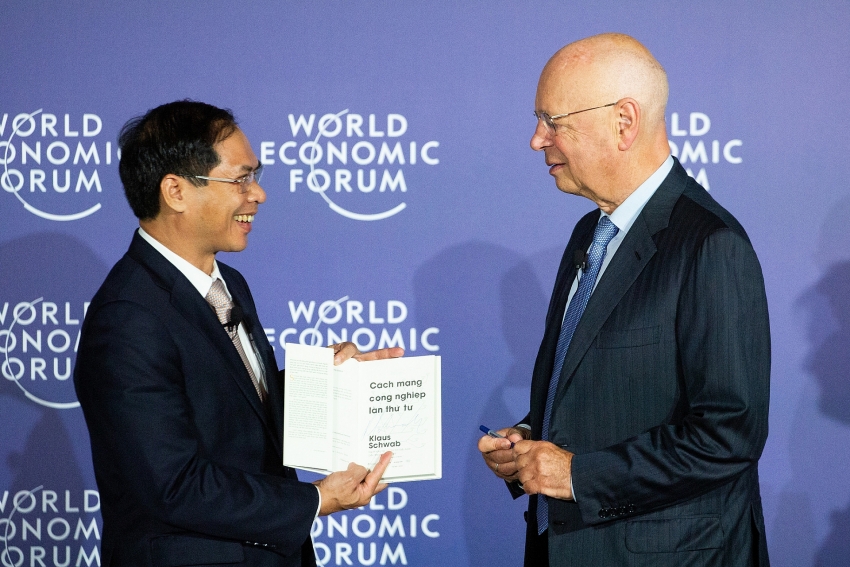Shaping the Fourth Industrial Revolution published in Vietnamese
The book aims to help leaders develop the techniques necessary to harness technological advances to solve critical global challenges.
“This is a big gift for Vietnamese enterprises, the government, ministries, and universities,” said Permanent Deputy Minister of Foreign Affairs Bui Thanh Son, who was presented with a copy by Schwab.
 |
| Klaus Schwab's 'Shaping the Fourth Industrial Revolution' has been translated to Vietnamese |
The book is a sequel to Schwab’s bestselling 2016 book, The Fourth Industrial Revolution. The new book provides a practical guide to understanding 12 sets of emerging technologies from a systems perspective and better appreciating the rules, norms, institutions, and values that shape their development and use.
This approach is necessary, Schwab argues, given the unprecedented speed at which technology is developing, which makes outdated and redundant the approaches of governments, regulators, and companies on which we rely to manage the impact of technologies.
Schwab’s response is for leaders to adopt a “systems leadership” approach to ensure that technology developments cannot occur without consideration given to rules, norms, values, and infrastructure. Unless technology develops within an inclusive and sustainable governance system, the Fourth Industrial Revolution could exacerbate income inequality and leave billions of people behind, while wasting the opportunity to deploy technology to help address global challenges.
“It took the world more than a decade to develop a collective response to climate change. If we take the same amount of time to respond to the Fourth Industrial Revolution, we will have lost the opportunity to influence the development of the technologies that shape the way we work, live, and act. If we act now, we have the opportunity to ensure that technologies—such as artificial intelligence—sustainably and meaningfully improve the lives and prospects of as many people as possible,” said Schwab.
The book calls on leaders to rapidly adopt the concept of agile governance of technologies, matching the nimbleness of technologies and the private-sector actors who create them in constantly updating and rethinking rules in collaboration with other sectors. For businesses, greater experimentation with new technologies and greater investment in people and skills are required to maximise firms’ ability to develop and bring to market winning innovations.
When it comes to the general public, Shaping the Fourth Industrial Revolution urges people to be engaged in the evolution of technology, and to make their voice heard to ensure that technology plays a positive role in helping to build a sustainable, inclusive, innovation-driven future.
Shaping the Fourth Industrial Revolution draws on the contributions of more than 200 of the world’s leading technology, economic, and sociological experts to present a practical guide for citizens, business leaders, social influencers, and policy-makers.
It outlines the most important dynamics of the technology revolution, highlights important stakeholders who are often overlooked in the discussion of the latest scientific breakthroughs, and explores 12 technology areas central to the future of humanity. It was co-authored by Nicholas Davis, the World Economic Forum’s Head of Society and Innovation, and features a foreword by Satya Nadella, CEO of Microsoft Corporation.
The preparation of this book has also led to the creation of the Centre for the Fourth Industrial Revolution in San Francisco, soon to be supported by a network of affiliated centres around the world, to establish an agile governance cooperation platform for business and government.
The World Economic Forum on ASEAN (WEF ASEAN) 2018 is themed “ASEAN 4.0: Entrepreneurship and the Fourth Industrial Revolution” and takes place in Hanoi from September 11-13. A record number of regional heads of state or government will participate in the event.
“We are honoured to welcome this record delegation of regional government leaders,” said Justin Wood, head of Asia-Pacific and member of the executive committee at the World Economic Forum. “The ASEAN region is currently one of the world’s bright spots for economic growth, and their presence shows the commitment they have to ensure this remains the case as the Fourth Industrial Revolution expands in economic scope and impact, and the geopolitical environment around them changes rapidly.”
What the stars mean:
★ Poor ★ ★ Promising ★★★ Good ★★★★ Very good ★★★★★ Exceptional
Related Contents
Latest News
More News
- NAB Innovation Centre underscores Vietnam’s appeal for tech investment (January 30, 2026 | 11:16)
- Vietnam moves towards market-based fuel management with E10 rollout (January 30, 2026 | 11:10)
- Vietnam startup funding enters a period of capital reset (January 30, 2026 | 11:06)
- Vietnam strengthens public debt management with World Bank and IMF (January 30, 2026 | 11:00)
- PM inspects APEC 2027 project progress in An Giang province (January 29, 2026 | 09:00)
- Vietnam among the world’s top 15 trading nations (January 28, 2026 | 17:12)
- Vietnam accelerates preparations for arbitration centre linked to new financial hub (January 28, 2026 | 17:09)
- Vietnam's IPO market on recovery trajectory (January 28, 2026 | 17:04)
- Digital economy takes centre stage in Vietnam’s new growth model (January 28, 2026 | 11:43)
- EU Council president to visit Vietnam amid partnership upgrade (January 28, 2026 | 11:00)

 Tag:
Tag:























 Mobile Version
Mobile Version